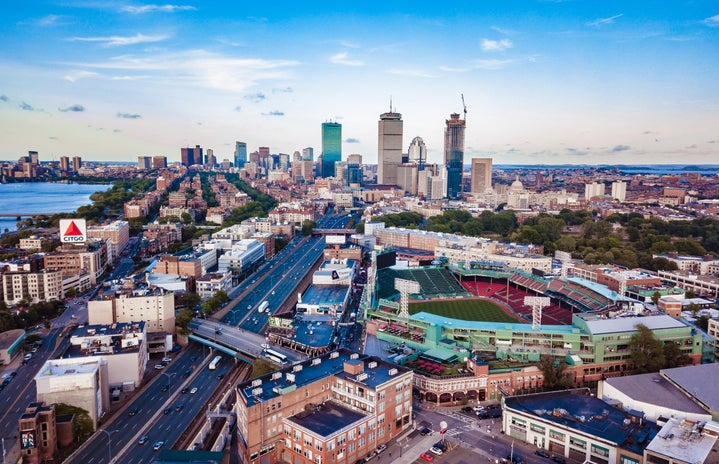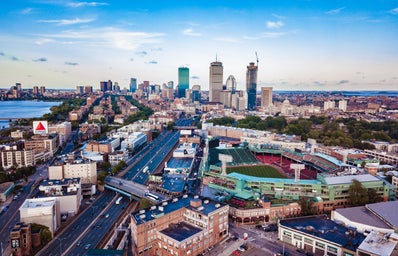Courtsey of Oya Opportunities
“Changing the world for the better isn’t someone else’s business – it’s up to all of us.” – Chelsea Clinton
From October 13-15, 1,200 students from 90 countries and all 50 states came together at Northeastern University in Boston for the 10th annual Clinton Global Initiative University (CGI U) conference. CGI U brings students, university representatives, topic experts and celebrities to one place to discuss challenges and develop solutions in five focus areas: education, environment, peace and human rights, poverty alleviation and public health. This year, student leaders made over 750 commitments to action to help local communities and address global issues.
Her Campus Miami staff writer Brianna Hernandez attended the conference as a CGI U commitment-maker from the University of Miami with her project URise, a program focused on helping increase service learning and civic engagement in underfunded and underrepresented schools in South Florida. Karisma Garg, a staff writer from Northeastern University’s Her Campus chapter, was a sideline observer of the students and speakers throughout the weekend. Together, the perspectives of the two students helped bridge the gap between doers and bystanders.
Courtesy of Xandie Kuenning
Karisma Garg, Northeastern University
It’s easy to feel intimidated in a room full of people who are successful and driven. During the conference I sat near a writer for the Boston Globe and I kept staring at how fast his fingers were typing; he was forming his story right then and there. I was the perfect juxtaposition sitting next to him. He was put-together and calm, while I was sweaty and a little too excited to be there. I even dropped my phone while President Clinton was speaking, drawing even more attention to the fact that I didn’t really have myself together.
When the panel began, I was awestruck. Ibtihaj Muhammad, an Olympic fencer, was the first hijab-wearing Muslim to compete in the Olympics. She used her sport to showcase her talent as well as her pride in being an athletic, outspoken and passionate black Muslim woman. Daryl Davis, race relations expert and musician, chose to meet with members of the Klu Klux Klan and wrote a book of the discussions they had. As a black man, Davis risked everything to confront a hateful organization in order to gain perspective and hopefully give some as well. Sandra Uwiringiyimana, the co-founder of Jimbere Fund, escaped her home country, the Democratic Republic of the Congo (DRC), where she lost her sister to deadly civil war. She rebuilt her life in Rochester, NY and set up a foundation to help women in the DRC and other areas. Finally, Thomas Edwards, a senior high school student at Strake Jesuit College Preparatory, saved the lives of strangers during the devastating storm, Hurricane Harvey. He did this all while maintaining a sense of humor and humility. Each person represented a different type of a bravery that I strive to have; the bravery to be an individual, the bravery to question opposition, the bravery to positively cope with hardship and the bravery to risk everything to help others.
The most inspiring, however, had to be the students. There were 1,200 students surrounding me as I took notes. I had a moment where I looked around and realized we all are similar in age. We all go to classes. We all eat dining hall food. We all are or have been in the same position within the last few years. But we weren’t all the same. Some students created programs and organizations to aid with poverty, hunger, education and violence. A graduate from Columbia created an organization called Unspoken Smiles, which promotes dental hygiene and health in developing countries. Another student from the University of Missouri created the Kansas City Free Eye Clinic, which partners with medical schools to provide poorer communities with access to eye doctors. I sat there surrounded by these students and thought, “How did they get here? What is different about what they are doing? And how can the people in my life and I do this too?” These ideas aren’t trying to solve the world’s largest issues at hand. They start with a specific problem and grow with passion and hard work. We all are similar, but we are not all the same. We all have ideas, but they were brave enough to do something with them.
With all the recent tragedies, such as the Las Vegas shooting or the political disaster that is our current presidential administration, it’s easy to feel voiceless. It feels like no matter how many tweets of solidarity or hashtags of awareness, nothing changes. But somehow, these students rise above that and say “I will be heard.” They aren’t screaming meaningless complaints about everything wrong in the world to the walls and feeds of their social media. They are doing something. They are creating and implementing projects to fix the world’s issues. Actions speak louder than words, and their actions are loud and clear in the face of our society demanding us to listen.
Brianna Hernandez, University of Miami
Twelve hours after leaving my house on October 13, I landed in Boston with the University of Miami cohort. We were exhausted but eager because we had had CGI U on the brain for weeks. The conference didn’t disappoint. We sat through plenary sessions where esteemed experts and revered role models shared their stories and insights. I completely geeked out when Madeleine Albright, the first female U.S. Secretary of State, took the stage for a panel discussion. Yes, the sessions and workshops were a huge part of my experience; however, they were not the most impactful aspect.
When you’re drooling over panelists and political dynasties, it can be easy to forget the people you’re drooling beside right? Wrong. My cohort, advisor, project partner and the 1,192 other people in the audience were the most riveting part of the experience. Talking to other commitment-makers made me reevaluate the logistics and organizational capacity of my project, URise. I was intimidated and inspired; sometimes simultaneously.
While sitting in the Newark Airport waiting for our connecting flight, our cohort advisor asked us to describe our experience in one word. My word was eye-opening (the hyphen makes it count). The other students opened me up to an even larger realm of possibility. They challenged me to continue to pursue passion and truth in the face of obstacles. Northeastern University Police Officer Luke reminded me of the beauty of a small selfless act that doesn’t even register in your brain, when he picked up a shovel on CGI U’s coveted Day of Action and jumped right in to serve beside us students. The panelists turned my eyes both outward and inward,forcing me to reconcile the two.
As a CGI U commitment-maker, I was supposed to have it all together; to have the solution to a pressing issue. I thought I did, then I spent three days at Northeastern University surrounded by people who seemed to have it all together; seemed to have the solution to a pressing issue. I realized none of us really know how to erase the opioid epidemic or eradicate poverty. We can only strive to combat them. What matters is that we have the courage and penchant for innovation to try. Congressman Kennedy told a room full of college students that the world needs us now more than ever. Well, we’re here and we’re committed to turning our ideas into actions. We will turn whispers into screams and push for our vision of the world we should live in.
Courtesy of Stefanie Rodriguez
CGI U reminded us of how interconnected we all are; how much stronger our differences make us. Although we care about different problems and are fueled by different experiences, we all share one world. CGI U may only happen once a year, but the inspiration to do something bigger than ourselves can last a lifetime. We both experienced CGI U from different perspectives, but we both left with eyes that are more open and hearts that more passionate.

